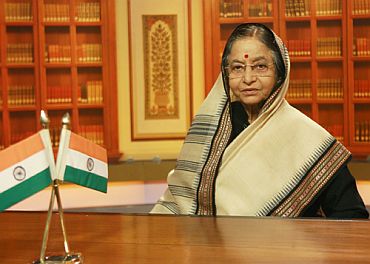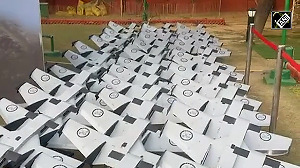 My Fellow Citizens,
My Fellow Citizens,
On the eve of our 62nd Republic Day, I extend my warmest greetings to all of you across the country and also to those living abroad.
I convey my special greetings to the members of our Armed Forces and Para-Military Forces, who guard our frontiers and to our internal security forces. I also compliment every citizen from every walk of life for contributing to the process of nation-building.
26th January is a very significant date in our nation's calendar, when we celebrate the establishment of free India as a Republic based on the ideology of justice and equality.
It is a day when we recall with gratitude the sacrifices of our freedom fighters and the work of our Founding Fathers, for giving to us a country where our dignity and individual freedoms are guaranteed by an enlightened Constitution. It must also be an occasion when we rededicate ourselves to maintaining harmony, peace and brotherhood. Most of all, it is a time to introspect about how we have fared so far, and in which direction are we moving.
For our achievements, the foremost credit goes to the drive and the dedicated hard work of millions of men and women of our country. We are witness to the increasing influence of India and its steady economic growth that has brought prosperity to an increasing number of people. We can be proud of our successes, but there are many significant tasks that are yet to be accomplished, in particular the pledge to empower the poor and the marginalized sections of our population so that they too can become a part of the growth story of our nation.
Dear Citizens,
We are fortunate that we are the inheritors of the ideals and values of one of the world's oldest civilizations, which has bequeathed to us a rich treasure of human experiences and thought. The concept of the human race being one, the importance of living in harmony with each other and with nature, the quest for knowledge and truth, find prominence in our age old culture.
These ideas provided inspiration for our freedom movement and after our independence found a ready resonance in our Constitution. As citizens of this country each one of us, therefore, has a duty and a responsibility to demonstrate, that these principles have given to us the motivation and the strength to build our great nation.
It is, however, a fact that there can be no society which does not need to evolve to cope with the changing demands of time; and there can be no nation which does not face challenges. India too has its share of problems and obstacles, constraints and difficulties. We cannot evade these or wish them away, but working in different fields, we must together find solutions.
The strength of a nation is not determined by the challenges it faces, but by its responses to these challenges, especially so when it stands at a critical juncture and at a decisive point. What we do in this coming decade in terms of leveraging our advantages and addressing our shortcomings, will shape the destiny of the nation.
Wherever course correction is required, it must be undertaken unhesitatingly and with urgency. There should be national consensus on critical national goals. Among such goals, eradication of poverty, empowerment of women, access to quality education and affordable health facilities are essential for building human resources. Apart from this, civic discipline, the readiness of people to work with dedication and integrity can make an enormously positive impact.
Dear Citizens,
Among our remarkable accomplishments has been an unwavering adherence to democracy. The people of India have expressed their confidence by participating time and again in the electoral processes. For us, democracy is an article of faith, important both as a basic pillar of our Republic and as a guarantor of our freedoms. Its sustenance is essential for the identity of India, hailed as the largest democracy in the world, and one that functions well even in situations of multiple complexities.
We must not only reinforce democratic institutions and processes, but also refrain from any action, taken wittingly or unwittingly, that dilutes or is detrimental to democracy.
The Parliament of the country is the repository of the sovereign will of the people, and its successful functioning is a joint responsibility of both the Government and the Opposition. It is important that the decorum and dignity of the House is upheld at all times.
The image of Parliament in the public mind should be one where proceedings, debates and discussions take place with a view to resolve issues through a constructive and co-operative approach. If this does not happen, people's faith in democratic institutions can be affected, resulting in a feeling of despondency which is unacceptable in a healthy democracy, as it may derail democratic institutions.
Hence, dialogue among stakeholders in democratic institutions is an integral part of democratic working.
The time has come for us to take a closer look at our social milieu. Is there growing criminalization of our society? Is there increasing apathy towards each other? Are we becoming too materialistic, shortsighted and unconcerned about the impact of our actions on our brethren, society or the environment?
It is a matter of anguish and great concern when a person is killed for a petty sum of money; or when a woman is raped because she protests against being teased; or when over small incidents, due to lack of patience, there is a quick flaring of tempers.
Cases of ragging in educational institutions are also disturbing. Ragging is violence. It is heinous and should not be tolerated, for it can cause irreparable loss to the parents and to the country. Our social fabric is deeply damaged by such incidents and it is essential that these tendencies are curbed in the interest of social harmony and cohesion. I appeal to my fellow citizens to never resort to violence.
Our nation won its freedom by travelling on the high path of non-violence and truth. In our journey as an independent nation too, we must adhere to it and demonstrate moral courage. Societies evolve in a positive direction when people work to bring about constructive changes and to eliminate social evils. In my first address to the nation on the eve of Republic Day in 2008, I had spoken on the need for social, economic, administrative and political activities to be carried out on the basis of moral values and social justice.
I reiterate the great importance of integrity, honesty, good conduct and high values, which our culture teaches us.
The youth of our country must carry forward this legacy. As the architects of the future of the country, their upbringing with a value-based education is paramount in the development of their character. It is said that the first teacher of the child is the mother when the child is of tender age, and the next is the primary school teacher. Both make lasting impressions on children in their formative years. In primary schools, teachers are doing good work.
We should regularly assess issues relating to training of teachers and quality of education including checking instances of absenteeism of teachers. In addition, our special efforts to reach out to students from tribal and remote areas, Scheduled Castes, Scheduled Tribes and other backward communities must be augmented.
Our endeavour should be to create a level playing field in educational competitiveness so that students from all sections of society can enter premier institutions like the Indian Institutes
Dear Citizens,
As a nation, our aim is to grow and to create a just society. Our goal of poverty eradication and of inclusive growth that embraces the disadvantaged and marginalized sections of society can be achieved when our actions are guided by a social conscience and are not devoid of sensitivity. We are seeking good governance and a people-centric administration. In this, callous and casual attitudes in the sphere of public service are unacceptable.
Delivery systems for schemes and programmes that promote the welfare of the people and spur economic growth should have inbuilt mechanisms for greater transparency and accountability. Education, health and skill building efforts will create productive human resources for the future. Urban and rural development schemes will make our cities and villages sustainable habitats.
Programmes for women, the youth, the girl child, the differently-abled and marginalized sections of society will equip them to avail of opportunities and face the future with confidence. We need to address the problems of orphans and street children, as well as of the old and destitute.
For the success of welfare schemes, the total sum of developmental funds must reach the intended beneficiaries. Corruption is the enemy of development and of good governance. Instead of getting lost in this mire, it is necessary to rise above it and seriously look at bringing systemic changes to deal more effectively with corruption.
Financial institutions, the corporate world and civil society - all must uphold high standards of probity in their working. Only a genuine partnership between the Government and its people can bring about positive change to create a just society.
The media plays an important role in bringing information, news and views to the public. This generates awareness, promotes discussion on issues and creates perceptions. There are numerous examples of outstanding conduct in the country where good samaritans are rendering yeoman service to society, some civil society organizations are putting in selfless work in the field as are some philanthropists, scientists and educationalists doing pioneering work.
By highlighting such actions the media can inspire others to follow good examples, and I would urge the media to work in a positive spirit, as it expands its reach and coverage.
A responsive and responsible media is an asset in maintaining the vitality of democracy and its institutions.
Fellow citizens,
It is heartening that our economy is progressing at a stable pace and that even in the face of difficult circumstances during the global financial downturn, its performance was appreciable. We are now returning to the pre-crisis growth pattern and are confident of growing at over 9 percent next year. All sectors of the economy will be contributors to our growth trajectory.
However, rising inflation particularly food prices, are a cause of serious concern and draw attention to the urgent need to take suitable action, and also look at more innovative approaches towards food security, agricultural production and rural development.
The Green Revolution which made our nation self sufficient in foodgrains has run its course. We need a Second Green Revolution that maximizes productivity, and yet generates income and employment opportunities for the rural population. The First Green Revolution was almost confined to irrigated areas, and now we should also focus on rain fed areas, which could become the cradle for the Second Green Revolution.
We should bear in mind that our agricultural holdings are fragmented, small and are likely to further decrease in size; making economic viability of farming a big issue. It is said that small farmers are leaving farming, because of poor returns and scarcity of agricultural labour. In such a situation, it would be advantageous to think of modernization and mechanized farming, and there should be deliberations on evolving suitable models for partnerships between farmers, private sector and the Government in agriculture and rural development.
In any arrangement, it should be kept in mind that farmers are stakeholders in every aspect related to agriculture, whether it is cultivation related activities, warehousing, processing, marketing, research or development. Farmers, therefore, must be involved in all these various activities, with a sensitivity that safeguards their rights on their land and its produce. The corporate sector should take up responsibility to make agriculture productivity remunerative, particularly in rain fed farming areas, as food security is of prime importance for our country.
Every year there is drought in some or the other part of the country. A national campaign for foodgrain productivity should be undertaken to create awareness about sustainable food production for food security in every State and in every block.
Similarly, national planning for integrated production, particularly of foodgrains like cereals, oilseeds and pulses is needed and should be implemented, given that our population in the next 20 years is likely to become 148 crore. Each State should, as far as possible and as per local conditions, try to produce food grains required by it. This will result in saving transport and storage costs, as also prevent wastage during transport and handling, besides helping in quicker distribution of foodgrains.
In agriculture as in all other fields we need innovations more than ever before. This decade has been designated as the 'Decade of Innovation' in India. Our scientists and researchers have the talent and the capacity to look at high-end technology as also at cost-effective, location-specific and affordable innovations for wider use in the country.
Access to innovations is an integral part of their practical use. In a situation of rapidly moving global knowledge economy, our pace of research must accelerate. Larger funds should be allocated for science and technology so that such scientists can undertake in depth research in a wide range of subjects.
Development and progress require an environment of stability and security. The work of our police and internal security agencies is critical in this field, as also is our cooperation and dialogue with our neighbours for stability in our region, and with the international community to create a peaceful world. Terrorism poses the single most detrimental threat to the progress of humankind. There is a crucial need for concerted action by all members of the international community to eradicate the threat of terrorism. India's profile in global affairs is the focus of international attention today.
As India assumes its seat as a non-permanent member of the UN Security Council, it will intensify efforts to effect concerted and collective global action against terrorism, and will also work with a deep sense of responsibility on all global issues.
Fellow Citizens,
Many developments in the last few years have brought to our attention the importance of united action to achieve our goals besides emphasizing the need to continue to adhere to the basic values of our country. Here, I am reminded of some lines of a well-known poem:-

Which means:-
Compassion, non-violence, goodwill
May always flow in unison.
With these words, I once again greet all fellow citizens on the occasion of Republic Day.
Jai Hind!






